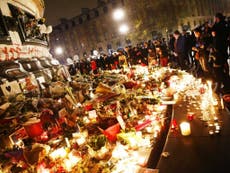In the battle for Europe, our values are our greatest weapons
The totalitarian, single‑idea mindset always seeks to remake its targets in its image. Hence the Isis hunger for reprisal and revenge.


The unusual surname rang a bell. Since Tuesday, millions of people around the world have heard or read the defiant tribute paid via Facebook by radio journalist Antoine Leiris to his wife Hélène Muyal, murdered a week ago in Paris during the Bataclan massacre. “I will not give you the satisfaction of hating you,” the widowed father, who vowed to raise their baby son “happy and free”, told her killers. “You want it, but to respond to hatred with anger would be to give in to the same ignorance that made you what you are,” he insisted.
Leiris is not such a common French name. A light-hearted tweet from early last year confirmed the connection I suspected. Someone had posted Francis Bacon’s extraordinary portrait of his friend Michel Leiris and asked, is there a link? “Actually, it’s my great-great-uncle,” Antoine had replied. “But I don’t have any Miros or Picassos or Bacons at home!”
Surrealist writer, art critic, anti-imperialist militant, anthropological explorer, expert in African and Caribbean cultures, Michel Leiris belonged to the post-Great War generation of avant-garde rebels in France. They alchemised the despair of their age into cultural upheaval at home and political liberation overseas. He lived until 1990, and in the late 1980s affirmed in an interview that Surrealism in Europe meant more than weird styles or naughty stunts. “What was going on was a rebellion against Western civilisation, plain and simple.”
Beyond the eccentric mischief-making of Dali, Buñuel, André Breton, and Leiris himself, “Our first political statement was the adoption of an anti-colonialist stance.” Specifically, the Surrealists condemned the “Guerre du Rif”. In that dirty war, after embarrassing setbacks, French and Spanish forces laboriously crushed a Berber uprising in Morocco. In 1924, a Spanish plane dropped mustard gas on insurgents. If the Surrealists helped to renew European culture – and they did – then they made progress by undermining the politician’s, the bishop’s and the general’s idea of “European values” on every front, from jokes to sex to dreams. Only the critical insider could save their home from smugness, and from savagery.
“You would like me to be scared,” said Antoine Leiris this week. “For me to look at my fellow citizens with a suspicious eye, for me to sacrifice my liberty for my security. You have lost.” Appalled by the inhuman brutality that Europeans traded with one another in the trenches and imposed on subject peoples, Antoine’s great-great-uncle and his comrades not only devoted their lives to a vision of unbounded liberty, they swapped the “suspicious eye” of conquest and control for the friendly, curious dialogue and solidarity of the traveller, the researcher, the seeker.
Leiris first studied in West Africa, then the West Indies, where he relished the “cultural clash” of the islands. Similarly, he loved jazz for its “hybrid aspect” that “combined African roots with elements from Western civilisation”. He also matured beyond negative chauvinism. Although the anti-colonial fury of his youth had tempted him into “a kind of inverted racism”, later he saw plainly that “within these splendid societies that ethnographers study there could be idiots and arseholes exactly as in ours”.
Against the closed-minded rage and lethal certainty of Isis and its sympathisers, liberals often wring their hands over the timidity of their case and cause. “The best lack all conviction,” as W B Yeats wrote in 1919, “while the worst/ Are full of passionate intensity.” You hear that lament a lot today, in various accents. It could be that, in their different ways, both Leirises have much to teach us about the strongest answers to life-denying hatred.
The eye must refuse to close in suspicion and contempt. The city, and the heart, must stay open to “the Other”. Normally, there are a dozen good reasons to shun that irritating scrap of shopworn campus jargon. But to thinkers such as Michel Leiris and his near-contemporary, the philosopher Emmanuel Levinas, it meant everything: that encounter with the stranger who alone will show you who you are. The spirit of the Bataclan, which Antoine Leiris miraculously summoned from the depths of grief, embodies a paradox that dogmatists of every stripe find hard to grasp. My precious “identity” – that threadbare cloak for many brands of bigotry – depends on a dialogue with you. The higher the fences I build, the more I lose myself. As Levinas wrote: “I find myself facing the Other.” Take that as a motto of the merry, messy multicultural city – or continent – that terrorists and autocrats detest.
For sure, it takes more guts and nous to stand up for a porous and malleable culture than for one that makes a fetish of its limits and its laws. Yet limestone will beat granite as a medium for art. And any ideal of “European” freedom has to acknowledge that it grew through doubt rather than faith, plurality not purity. Tolerant humanism emerged in the 16th century just as free-thinkers turned away in disgust both from the internecine slaughter of religious warfare on their doorsteps and the horrors of the first colonial conquests.
“Europe”, as the champions of free minds and welcoming cities now promote it, begins not as a manifesto, still less as a fortress, but as a quarrel – a quarrel with itself. As early as 1580, Michel de Montaigne had in his seminal essay “Of Cannibals” asked why we think our way of life superior to others’. “Everyone gives the title of barbarism to everything that is not in use in his own country.” Wherever we happen to live, “there is always the perfect religion, there the perfect government, there the most exact and accomplished usage of all things”. As for the “cannibals” of the newly explored Americas, they lag far behind civilised Europe not in human decency but merely in cruelty, hatred, treachery and avarice. In John Florio’s translation, this essay left so deep a mark on William Shakespeare’s imagination that he lifted chunks of it almost verbatim into The Tempest.
Advocates of some inspirational counter-narrative to the murderous one-note fantasies of the jihadis have to start from here. Their “Europe of liberties” begins in unsparing self-scrutiny about its own ethical pretensions. “Cultural relativism”, or at least an absorbent pluralism, does not betray some sacred essence of the European mind. It is that essence. Hence the danger of identifying the fate of Europe with any single financial-political machine or even an overarching goal of “ever-closer union”. David Cameron may believe that his labile model of Europe’s future reflects a very English pragmatism. It might equally express the thoroughly French scepticism about tyrannous abstractions you find in Montaigne, Camus or the bracing teacher-essayist “Alain” (pen name of Emile Chartier), who memorably wrote: “Nothing is more dangerous than an idea, when you have just the one.”
The totalitarian, single-idea mindset always seeks to remake its targets in its image. Hence the Isis hunger for reprisal and revenge. The regiment of freedom, however, must refuse to think of itself as a regiment. Rather, it’s a café; a bar; a restaurant; a rock venue; a temple to any god, and to none. During the Blitz, George Orwell pondered how the enemies of fascism could fight it effectively without becoming fascists themselves, at a time when “highly civilised human beings are flying overhead, trying to kill me”. The same question demands fresh solutions now, as Republican front-runner Donald Trump entertains the nightmare of a “Muslim database”. Wishy-washy half-measures, Donald: why not herd them into well-run camps?
As Orwell understood, words and ideas remain formidable weapons against that sort of creeping, or galloping, fascism. This week, I heard Rowan Williams, former Archbishop of Canterbury, deliver an eloquent defence of the language of freedom during the annual Orwell Lecture. Williams traced the affinities between Orwell’s analysis of the corruption of public speech and that of the Catholic writer – and Trappist monk – Thomas Merton. In the 1960s, Merton excoriated the degraded and manipulative clichés of advertising and militarism. Between them, they softened up the American public for inhuman, racist wars in South-east Asia. As the language of truth withered, so did dialogue.
Inevitably, given the pain of Paris today, Williams went on to contrast the deadly claustrophobia of the terrorist’s sloganeering with the sort of speech that clears a path to dialogue – even when you fear your foe will never take it. However atrocious the acts and words of enemies, “You do not seek to dehumanise them, or put them outside the boundaries of human discussion and exchange”. Listening to Williams, I thought of Antoine Leiris, who in his sorrow and courage chose to speak directly to his tormentors. Williams argued for “a pattern of free and civil exchange that is neither bland nor violent.” Only a culture that keeps on talking – to everyone, about everything – can be sure of having the last word.




Join our commenting forum
Join thought-provoking conversations, follow other Independent readers and see their replies